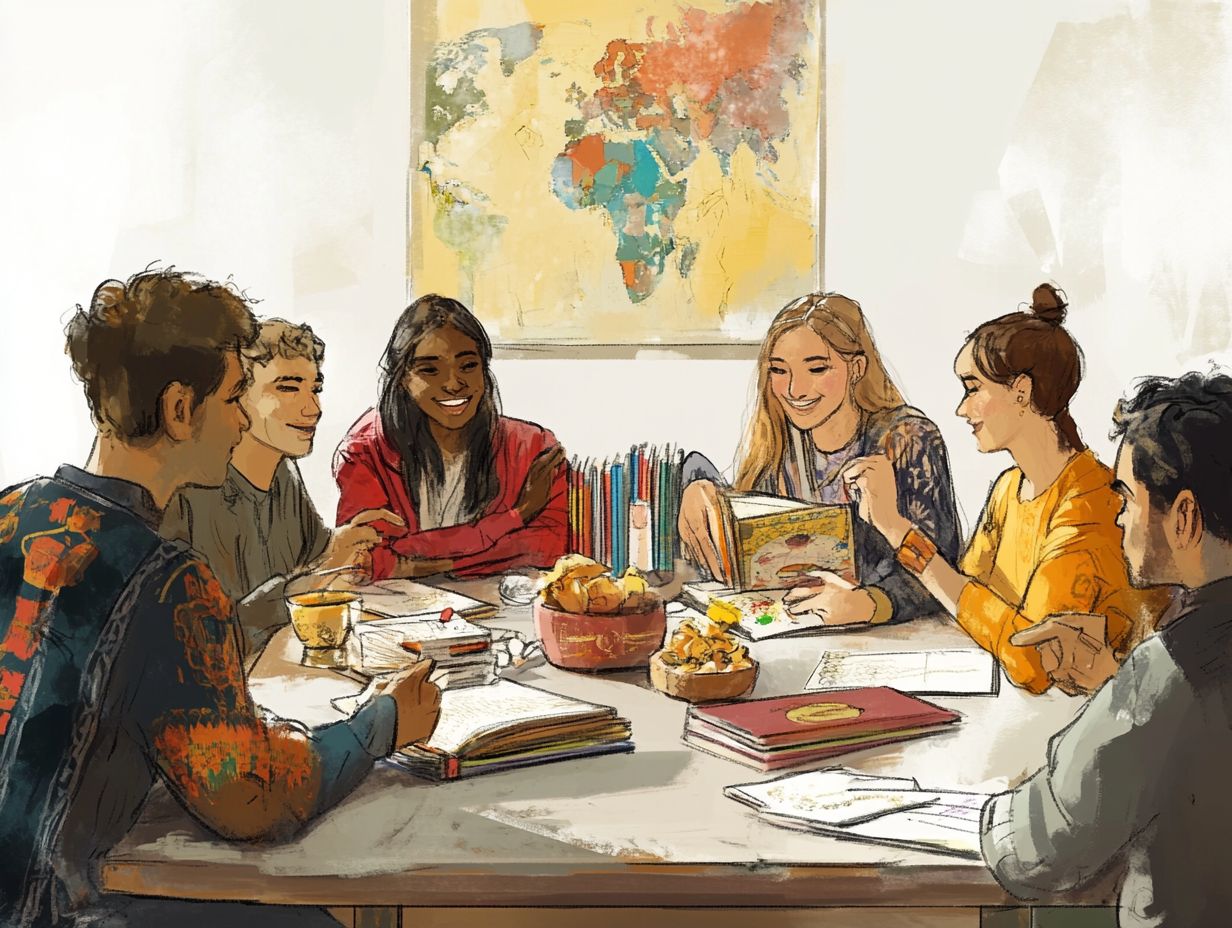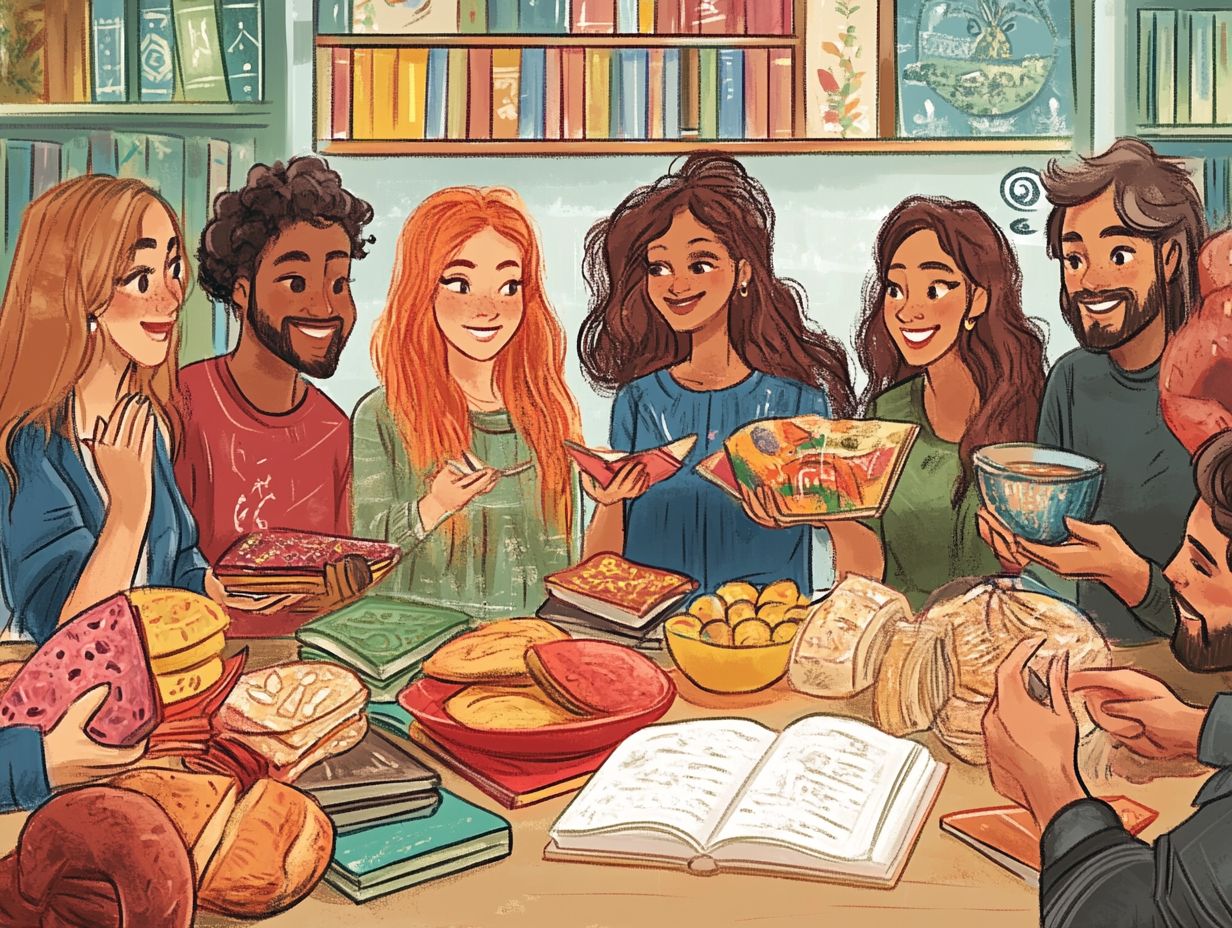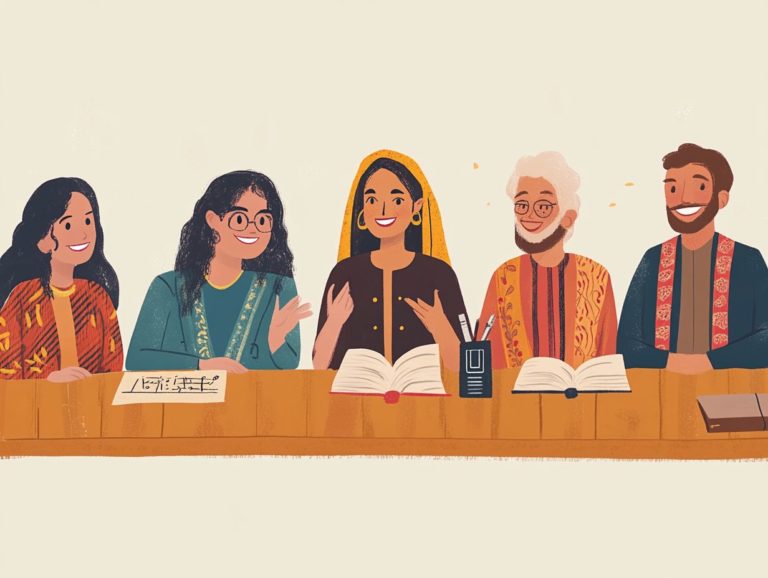10 cultural practices to enhance language skills
Language learning transcends mere grammar and vocabulary; it s fundamentally about forging connections with culture.
By immersing yourself in the customs, arts, and daily life associated with a language, you can significantly enhance your skills while making the learning journey far more enjoyable.
This article delves into ten vibrant cultural practices from reading captivating literature and watching compelling films to participating in language exchange programs and engaging in cultural events.
Explore how these activities not only strengthen your language proficiency but also deepen your understanding of the world around you.
Contents
- Key Takeaways:
- 1. Reading Books in the Target Language
- 2. Watching Films and TV Shows in the Target Language
- 3. Listening to Music and Podcasts in the Target Language
- 4. Attending Cultural Events and Festivals
- 5. Joining a Language Exchange Program
- 6. Immersing Yourself in the Culture
- 7. Taking Language Classes
- 8. Participating in Online Language Communities
- 9. Traveling to a Country Where the Language is Spoken
- 10. Practicing with Native Speakers
- Why Is It Important to Incorporate Cultural Practices into Language Learning?
- What Are the Benefits of Diving into the Culture?
- How Can Cultural Practices Help with Language Retention?
- What Are Some Common Cultural Practices That Can Enhance Language Skills?
- How Can One Overcome Cultural Barriers in Language Learning?
- What Are Some Tips for Incorporating Cultural Practices into Language Learning?
- Frequently Asked Questions
- 1. What are the 10 cultural practices that can enhance language skills?
- 2. How can reading literature improve language skills?
- 3. Why is participating in language exchange programs beneficial?
- 4. Can attending cultural events enhance language skills?
- 5. How does studying abroad contribute to language skills?
- 6. Are language learning apps effective?
Key Takeaways:

- Immerse yourself in culture to enhance language skills.
- Participate in cultural events and festivals.
- Join a language exchange program with native speakers.
1. Reading Books in the Target Language
Reading books in your target language improves your language skills and immerses you in the rich mix of cultural elements associated with that language. This experience fosters a deeper understanding of cultural nuances, traditions, and everyday customs essential for effective communication.
Exploring various genres, such as fiction, non-fiction, poetry, and graphic novels, can yield unique benefits tailored to your learning journey. For instance, diving into classic novels like “Don Quixote” in Spanish offers a treasure trove of vocabulary and historical context. Modern reads like “The Hunger Games” in English captivate younger audiences with relatable themes.
Engaging with authentic materials like newspapers and blogs enhances your learning. These resources place you in real-world contexts where you encounter diverse expressions.
This exposure sharpens your critical thinking skills as you analyze different perspectives and cultural subtleties, enriching your overall understanding of the language and its speakers.
2. Watching Films and TV Shows in the Target Language
Watching films and TV shows in your target language offers an engaging experience that lets you absorb vocabulary, cultural customs, and real-life contexts, significantly enhancing your language learning journey.
This dynamic approach reinforces your memory of new words and places them within relatable narratives, making it easier for you to recall and use vocabulary in everyday conversation.
Visual storytelling immerses you in cultural nuances and idioms often overlooked in textbooks, bridging the gap between academic learning and practical application.
By observing characters navigate various social scenarios, you gain a deeper appreciation for subtleties of expression and tone.
Popular films and series, like “Coco” for Spanish learners or “Lupin” for French enthusiasts, beautifully reflect local culture and showcase language diversity, proving invaluable in your language acquisition process.
3. Listening to Music and Podcasts in the Target Language
Listening to music and podcasts in your target language will supercharge your language learning! It immerses you in various accents, vocabulary, and cultural nuances, all while honing your listening comprehension and pronunciation skills.
These auditory resources are a treasure trove of authentic materials that reflect everyday language, essential for building practical vocabulary grounded in real-life contexts. For example, genres like pop or folk music introduce you to colloquial expressions, while podcasts centered on local news or culture enhance your understanding of societal norms and idiomatic usage.
Notable podcasts such as “Coffee Break Languages” or “Real Life English” are tailored specifically for language learners, seamlessly blending entertainment with education. Engaging with these mediums creates a natural learning environment where contextual listening fosters deeper retention and application of new vocabulary.
Start your immersive journey now and watch your language skills soar!
4. Attending Cultural Events and Festivals
Attending cultural events and festivals offers an invaluable opportunity to immerse yourself in local culture, engage in cultural exchange, and practice your language skills in authentic environments. You’ll savor vibrant customs and traditions while enhancing your language proficiency and forming meaningful connections with individuals from diverse backgrounds.
Take, for example, the San Antonio Fiesta, celebrated annually. It showcases the city s rich Hispanic heritage through lively parades, music, and food. Here, you can interact with native speakers while enjoying traditional games and culinary delights.
The Houston Livestock Show and Rodeo presents a unique slice of Texas culture. You can converse with cowboys and ranchers, gaining valuable insights into the region s deep-rooted traditions.
Participating in such events builds your confidence and creates lasting memories while deepening your appreciation for the cultural tapestry that shapes Texas.
5. Joining a Language Exchange Program
Joining a language exchange program connects you with native speakers, elevating your language skills and fostering understanding of different cultures. These programs help you achieve your personalized language goals through structured learning.
These programs come in various forms, from online platforms like Tandem to Meetup groups that facilitate local gatherings. You can practice conversational skills in a relaxed environment.
Each option promotes language fluency while immersing you in the culture. Explore 5 ways to connect language learning with local culture and engage in discussions about traditions, customs, and daily life to enhance your understanding of the language’s context.
Through these interactions, you ll discover networking opportunities that allow you to forge friendships and build professional connections. This can lead to future collaborations or travel adventures, making your learning journey even more fulfilling.
6. Immersing Yourself in the Culture

Dive right in! Immerse yourself in the culture of your target language for a deep learning experience. Connect with the cultural background, partake in local practices, and elevate your language proficiency and critical thinking skills.
One enriching avenue of cultural immersion is volunteering within local communities. This cultivates a genuine sense of connection and provides invaluable context for everyday interactions.
Attending local festivals and events reveals the subtleties of the language, uncovering idiomatic expressions and colloquial phrases that often slip by unnoticed in traditional studies.
Engaging with individuals from diverse backgrounds gives you firsthand insight into cultural norms and values, enriching your vocabulary while fostering a deeper appreciation for the nuances of communication within that culture.
7. Taking Language Classes
Taking language classes offers a structured environment to enhance your language skills through systematic grammar instruction and literacy development, guided by qualified teachers who enrich the classroom with cultural insights.
In these settings, you ll benefit from engaging methodologies that incorporate group discussions, role-playing, and multimedia resources, fostering both engagement and practical application of the language.
Personalized feedback from instructors is invaluable, helping you tackle individual challenges and ensuring your progress aligns with your unique pace.
Language classes immersively introduce you to cultural nuances through themed projects and activities, bridging the gap between language proficiency and real-world communication.
This holistic approach cultivates your linguistic abilities and enhances cross-cultural understanding, making your learning journey both enriching and rewarding. Join a festival today and start your adventure in cultural learning!
8. Participating in Online Language Communities
Participating in online language communities allows you to share effective learning strategies and engage in language exchanges while deepening your cultural understanding. You will connect with fellow learners and native speakers from around the globe.
These platforms social media groups, specialized forums, language learning apps, and interactive websites create unique networking spaces where you can discuss intricate language details and navigate diverse cultural contexts. You can forge friendships that transcend geographical boundaries.
These interactions improve your language skills through collaborative projects and group challenges. They also provide real feedback and personalized learning paths. Ultimately, these communities are invaluable resources, enriching your learning experience and promoting global connections through a shared passion for languages.
9. Traveling to a Country Where the Language is Spoken
Traveling to a country where the language is spoken presents an exceptional opportunity for full immersion. This experience allows you to dive into the local culture, navigate public transport easily, and engage in meaningful conversations with native speakers.
Fully immersed experiences not only accelerate your language acquisition but also deepen your understanding of cultural nuances and everyday customs that often slip through the cracks in traditional classroom settings.
To get the most out of your learning abroad, consider engaging in local activities like:
- Cooking classes
- Music festivals
- Guided tours led by residents
These interactions offer practical contexts for using the language, making it easier to remember phrases and vocabulary. Striking up spontaneous conversations in cafes or markets can lead to invaluable insights, boosting your confidence and fluency while fostering genuine connections with the local community.
10. Practicing with Native Speakers
Practicing with native speakers is crucial for honing your language skills and deepening your cultural understanding. It provides you with real feedback and insights into the nuances that textbooks often overlook.
Engaging in conversations with those who have mastered the language allows you to experience real-world usage in various contexts, significantly enhancing your fluency and comprehension.
To connect with language partners, consider exploring:
- Language exchange apps
- Local meetups
- Online forums
- Social media groups dedicated to language learning
These interactions expand your vocabulary through everyday dialogue and foster vibrant cultural exchanges. You will have the opportunity to ask questions about traditions, expressions, and customs that will further enrich your linguistic journey.
Why Is It Important to Incorporate Cultural Practices into Language Learning?
Incorporating cultural practices into your language learning is essential. It deepens your understanding of the culture, enhances your immersion, and ensures you can communicate effectively in real-life situations. To further enrich your experience, consider implementing 5 strategies to maintain language skills, all while appreciating the rich tapestry of the language’s cultural background.
This approach hones your linguistic skills and enables you to engage authentically with native speakers. You’ll grasp the nuances, idioms, and expressions that reflect a society’s values and traditions.
Exposure to cultural elements like music, cuisine, literature, and art can ignite your interest and motivation, transforming the learning process into an engaging exploration.
By participating in cultural events or festivals related to the language, you create memorable experiences that reinforce vocabulary and pronunciation. These connections make your language journey thrilling and enjoyable!
What Are the Benefits of Diving into the Culture?

Diving into the culture of your target language unlocks benefits like better language retention and improved communication. You gain a richer learning experience that connects you with authentic cultural customs.
Engaging in this way helps you encounter everyday vocabulary and phrases in context, making them easier to remember and use. For example, participating in local festivals or cooking classes can introduce you to specific cooking words and expressions tied to cuisine, deepening your understanding of food culture.
Interacting with native speakers broadens your vocabulary and provides valuable insights into colloquialisms and idioms, essential for achieving fluency.
Watching films or listening to music in your target language sharpens your comprehension and pronunciation skills, reinforcing the vital link between language and culture.
How Can Cultural Practices Help with Language Retention?
Cultural practices are an important part of your journey to retain a language, offering contextual learning that boosts literacy and reinforces vocabulary through real-life applications. Exploring 10 ways culture enriches language learning experiences can further enhance this process.
When you immerse yourself in activities like cooking traditional recipes, attending local festivals, or participating in community storytelling sessions, you experience its rich nuances firsthand.
While cooking, you might pick up specific vocabulary related to ingredients and cooking techniques, refining your grasp of sentence structure and grammar.
Participating in cultural dances or music exposes you to expressions often absent from textbooks. These hands-on activities solidify your language skills and, when combined with 5 strategies for effective language practice, foster a deeper connection to the culture itself, transforming learning into something enjoyable and unforgettable.
What Are Some Common Cultural Practices That Can Enhance Language Skills?
Engaging in common cultural practices like attending local festivals, participating in community projects, and diving into role-playing can greatly boost your language skills with hands-on learning experiences. For more ideas, explore 7 ways to engage with local culture for language learning.
These activities provide opportunities to practice speaking and listening while immersing you in regional dialects and slang. Festivals abound with traditional music and dance, giving you a glimpse into the history and values of the culture.
Community projects foster collaboration with native speakers, enriching your vocabulary and boosting your conversational confidence.
Meanwhile, role-playing places you in real-life scenarios, sharpening your contextual understanding and the cultural nuances crucial for mastering any language.
Overall, these practices deepen your appreciation for cultural heritages and significantly enhance your linguistic capabilities, including various ways to integrate language learning into daily life.
How Can One Overcome Cultural Barriers in Language Learning?
Understanding cultural differences helps you learn better and adapt your strategies to navigate these differences. This approach enhances communication and fosters a positive learning environment.
A great way to do this is to seek mentorship from native speakers. This allows you to gain insights into linguistic nuances and cultural contexts often overlooked by textbooks. Engaging in cultural exchange programs boosts your appreciation for diverse customs, providing firsthand experiences that deepen your understanding.
Being open to learning about various traditions cultivates an atmosphere of respect and curiosity, essential for dismantling stereotypes. Ultimately, these strategies, along with 7 fun ways to practice language speaking skills, enhance your language skills and help you build meaningful relationships that transcend cultural boundaries.
What Are Some Tips for Incorporating Cultural Practices into Language Learning?
Incorporating cultural practices into your language learning can truly elevate your experience. By exploring 5 ways to incorporate culture in language learning, you can engage with local communities, use authentic materials, and set culturally relevant goals for a richer understanding.
Actively seek out opportunities to immerse yourself in cultural events. These experiences enhance your comprehension and appreciation of the language.
Join clubs or online forums that focus on specific cultural elements. This enables meaningful dialogue and valuable connections.
Explore literature, music, and films from the target culture. These will expand your vocabulary and deepen your contextual understanding.
This approach sharpens your language skills while cultivating a profound appreciation for cultural nuances. You ll find the learning process both enjoyable and effective.
Frequently Asked Questions
1. What are the 10 cultural practices that can enhance language skills?

The 10 cultural practices include reading literature, watching movies, listening to music, attending cultural events, participating in language exchange programs, studying abroad, immersing yourself in the culture, practicing with native speakers, learning through cooking, and exploring language learning tips inspired by cultural practices.
2. How can reading literature improve language skills?
Reading literature in your target language introduces new vocabulary and sentence structures. It also enhances your reading comprehension and overall language skills.
3. Why is participating in language exchange programs beneficial?
Language exchange programs let you practice with native speakers in real conversations. This improves your speaking and listening skills and deepens your cultural understanding.
4. Can attending cultural events enhance language skills?
Absolutely! Cultural events like festivals and concerts immerse you in the language. They help you learn new words and observe native speakers in their environment.
5. How does studying abroad contribute to language skills?
Studying abroad provides complete immersion in the language and culture. You’ll practice language skills in real-life situations, improving speaking, listening, reading, and writing.
6. Are language learning apps effective?
Yes, language learning apps and online resources are convenient tools for enhancing your skills. They offer interactive lessons and vocabulary games. However, practice with native speakers remains essential for a well-rounded experience.





